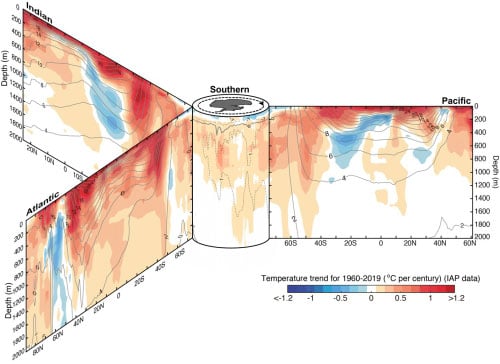Human-emitted greenhouse gases (GHGs) have brought about a long haul and unequivocal warming of the planet. Over 90% of the abundance of heat is stored in the world’s oceans, where it gathers and causes increases in ocean temperature. As the beaches are the main respiratory of the Earth’s energy imbalance, estimating ocean heat content (OHC) is a standout amongst other approaches to measuring the pace of global warming.
A study conducted by an international team of 14 scientists from 11 institutes across the world suggests that the world’s oceans were the warmest in 2019 than any other time in recorded human history. Furthermore, their analysis suggests that the past decade has been the warmest on record for global ocean temperatures, with the past five years holding the highest record.
The 2019 ocean temperature is about 0.075 degrees Celsius over 1981-2010 normal. To arrive at this temperature, according to scientists, the ocean would have taken in 228,000,000,000,000,000,000,000 (228 Sextillion) Joules of heat.
Scientists used a moderately new strategy for examination to represent possibly sparse data and time disparities in instruments that were recently used to gauge ocean warmth exceptionally from the surface to 2,000 meters down. The data enabled scientists to determine warmth trends dating back to the 1950s.

This study also includes ocean temperature changes recorded by the National Oceanic and Atmospheric Administration (NOAA) in the United States. The two independent data sets indicate that the past five years have been the warmest on record for global ocean temperatures.
By comparing the 1987 to 2019 data recording period to the 1955 to 1986 period, scientists found that over the past six decades, the more recent warming was about 450 percent that of the earlier warming. And that’s huge!
John ABRAHAM, co-author and professor of mechanical engineering at the University of St. Thomas in the United States, said, “It is critical to understand how fast things are changing. The key to answering this question is in the oceans — that’s where the vast majority of the heat ends up. If you want to understand global warming, you have to measure ocean warming.”
The study also stated that humans could work to switch their impact on the climate. However, the oceans will take more time to respond to atmospheric and land environments.
The authors published their results on Jan. 13 in Advances in Atmospheric Sciences, with a call to action for humans to reverse climate change.
